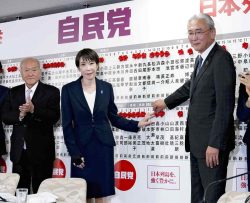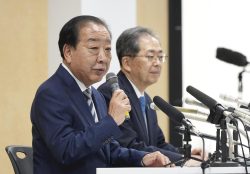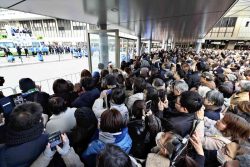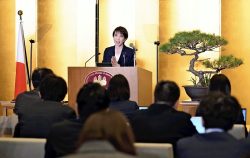Candidates’ 1st Speeches Reflect the Many Issues Facing the Capital; Tokyo Gov. Koike Stresses Accomplishments, Renho Emphasizes Position as Challenger
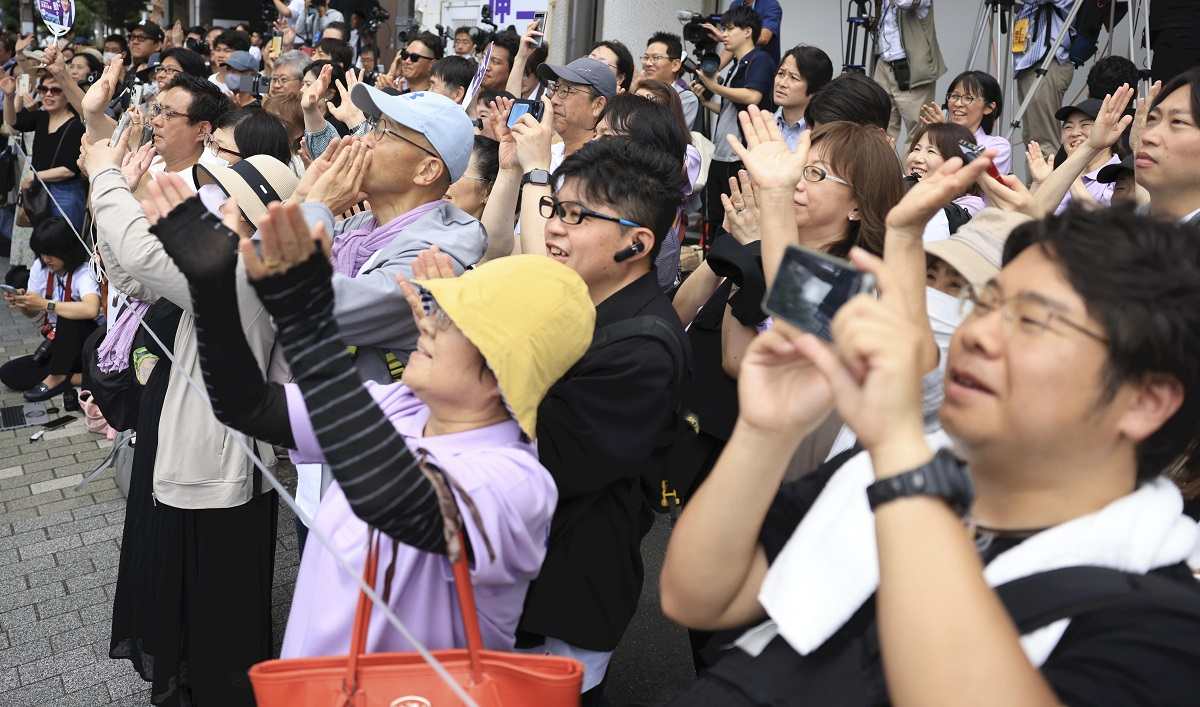
People listen to a candidate’s speech Thursday morning in Tokyo.
18:04 JST, June 21, 2024
Tokyo’s gubernatorial race officially kicked off on Thursday, beginning a war of words which will last 17 days, until the July 7 election.
The major issues in the previous gubernatorial election, in 2020, were how to handle the COVID-19 pandemic and whether to hold the Tokyo Olympics and Paralympics. The various candidates in the present race focused on diverse issues in their first campaign speeches, reflecting the reality that Tokyo now faces a wide variety of challenges.
Incumbent Gov. Yuriko Koike, 71, spent half of her speech looking back on her two-term, eight-year administration so far. Mentioning the 1,200 days in which she was franticly busy dealing with the pandemic, Koike stressed, “I worked hand-in-hand with experts to protect people’s lives.” Regarding child-rearing policies, she emphasized that she had made a major decision to remove an income limit for child-rearing allowances.
She devoted a major part of her speech to administrative and fiscal reforms she has implemented as governor. She boasted that she had secured ¥810 billion in resources from thorough administrative reforms over her eight years.
As the incumbent governor, her campaign pledges covered a wide array of issues facing the Tokyo metropolitan government. She touched on nine areas, including: disaster preparation and prevention; making society more pleasant as lifespans increase; active participation of women in society; digitalization; and promotion of the rural Tama area and remote islands. “There are a mountain of issues in front of us, but I will face them squarely,” Koike emphasized.
Koike is good at creating simple and easy-to-understand phrases. For the latest election, she has chosen “Defending the capital” to express her goal of protecting Tokyo’s economy and the lives of its citizens.
‘My specialty’
“Here in Tokyo, where I was born and raised, I challenge the incumbent to a fight.”
“I, Renho the challenger, will keep running until the Tanabata festival [on July 7].”
Former House of Councillors member Renho, 56, used the word “challenge” twice in her speech in order to drive home the impression that she is going head-to-head with the incumbent governor.
Her first campaign speech lasted for about nine minutes. “Politics have been deteriorating. I want to become a leader and make a change starting right here, in Tokyo,” Renho said at the beginning of her speech, with the recent political funds scandal involving factions of the ruling Liberal Democratic Party in mind.
In contrast to Koike, Renho made just two policy pledges. One of them was to combat the decreasing birthrate, a topic to which she devoted nearly half of her speech. She said she would increase young people’s income so that they would be able to get married and have children. “Eliminating young people’s burdens and anxieties is the task of the Tokyo governor,” Renho said.
As for the other pledge, which was to carry out administrative and fiscal reforms, she emphasized that that was her specialty, saying, “Regarding the question of whether taxpayers’ money is used properly, I will bring everything into view.”
‘Age doesn’t matter’
Shinji Ishimaru, 41, former mayor of Akitakata, Hiroshima Prefecture, put his personality and political stance at the forefront of his speech. After making the usual greetings, he began by declaring, “I am 41 years old, and I have been a politician for only four years.” He cited the example of Napoleon, who became the emperor of France in his 30s, and used his youth to appeal to the audience, saying “This age is not too young to start something, or to change something.”
Former Air Self-Defense Force Chief of Staff Toshio Tamogami, 75, said at the beginning of his speech: “I am much younger than U.S. President Joe Biden and former U.S. President Donald Trump. So, there is no reason that I cannot do this job,” drawing laughter from the audience.
Then he took about a minute each to introduce the measures he wanted to take on disaster preparation, education and tax cuts. He tactfully concluded his speech saying, “I am capable of getting things done thanks to my experience in the Self-Defense Forces.”
Hiroshi Shiratori, professor of contemporary political analysis at Hosei University, said, “Their first campaign speeches well reflected the differences in the candidates’ election strategies.”
However, he added, “They just said what they wanted to say and they did not clearly describe the future state of Tokyo they envision. I would like them to concretely delineate their views so voters can choose between them.”
Top Articles in Politics
-

LDP Wins Historic Landslide Victory
-

LDP Wins Landslide Victory, Secures Single-party Majority; Ruling Coalition with JIP Poised to Secure Over 300 seats (UPDATE 1)
-

Japan Tourism Agency Calls for Strengthening Measures Against Overtourism
-

CRA Leadership Election Will Center on Party Rebuilding; Lower House Defeat Leaves Divisions among Former CDPJ, Komeito Members
-

Voters Using AI to Choose Candidates in Japan’s Upcoming General Election; ChatGPT, Other AI Services Found Providing Incorrect Information
JN ACCESS RANKING
-

Japan Institute to Use Domestic Commercial Optical Lattice Clock to Set Japan Standard Time
-

Israeli Ambassador to Japan Speaks about Japan’s Role in the Reconstruction of Gaza
-

Man Infected with Measles May Have Come in Contact with Many People in Tokyo, Went to Store, Restaurant Around When Symptoms Emerged
-

Prudential Life Insurance Plans to Fully Compensate for Damages Caused by Fraudulent Actions Without Waiting for Third-Party Committee Review
-

Woman with Measles Visited Hospital in Tokyo Multiple Times Before Being Diagnosed with Disease


